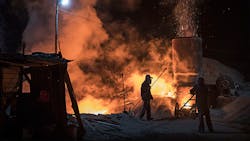China asked the U.S. to provide compensation for lost trade due to President Donald Trump’s proposed tariffs on steel and aluminum, in a preliminary step that could lead to a dispute between the two nations at the World Trade Organization.
In two filings with the WTO on Monday, China dismissed the U.S. assertion that the metal tariffs were instituted on national security grounds, arguing instead that they were safeguard measures -- temporary trade restrictions aimed at protecting domestic producers.
China responded to the U.S. action by threatening to impose tariffs on $3 billion of U.S. imports -- including agricultural, steel and aluminum products -- and its ambassador to the U.S. said all options are on the table, though the Asian nation doesn’t want a trade war. The levies are expected to affect $689 million worth of Chinese steel and aluminum exports to the U.S., according to data published by the Peterson Institute for International Economics.
“Less than 3% of the U.S. imports of steel came from China, so it really baffles us how such a low rate of imports constitutes a threat to U.S. national security,” Chinese Ministry of Foreign Affairs spokeswoman Hua Chunying said Tuesday at a briefing in Beijing. “We have good reasons to question the legality and legitimacy of many actions taken by the U.S. on the grounds of national security.”
If the U.S. rejects China’s argument that the measures are safeguards, China may have recourse to ask the WTO to mediate the disagreement in a formal dispute proceeding. China said it reserved the right to file a dispute at a later date, according to the filings.
Separately, the European Union took the first step toward protecting EU-based steel manufacturers on Monday when the European Commission opened a “safeguard” probe into whether the 25% levy on foreign steel imposed last week by Trump is diverting worldwide shipments to the EU market.
The probe marks the defensive part of a three-pronged strategy that the EU has drawn up to respond to the U.S. steel tariff and to a 10% levy on foreign aluminum.
By Bryce Baschuk
About the Author
Bloomberg
Licensed content from Bloomberg, copyright 2016.
